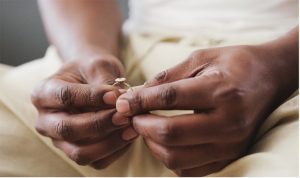According to the Office for National Statistics, there were 80,057 divorces granted in England and Wales in 2022, marking a 29.5% decrease compared to 2021, which saw 113,505 divorces. This is the lowest number of divorces since 1971. These figures do not account for individuals who separated without officially divorcing or those who split up with a long-term partner without being married. It’s quite likely that you know a friend, family member, or colleague who is going through a divorce or separation.
When we think of grieving and loss, we often associate it with the death of a loved one. However, loss and grief can also arise from other life events, such as separation or divorce. The end of a marriage or relationship, regardless of the circumstances, is a profound loss that can trigger a complex and multifaceted grieving process. Understanding this grief and learning how to navigate it is crucial for moving forward and finding healing.
Understanding the Grief of Divorce or loss of a relationship.
Grieving a marriage breakdown involves more than just mourning the end of a relationship; it encompasses the loss of dreams, shared experiences, and the future you envisioned together. Here are some key aspects of this unique form of grief:
Emotional Turmoil The end of a marriage or long-term relationship can unleash whirlwind of emotions: sadness, anger, relief, guilt, confusion, and fear. It’s normal to feel like you’re on an emotional rollercoaster. Recognising and accepting these feelings is the first step towards healing.
Loss of Identity When you’re married, a significant part of your identity is tied to being a spouse. Divorce can shatter this sense of self, leaving you to rediscover who you are outside of the relationship.
Disruption of Routine Divorce often disrupts daily routines and living arrangements, adding a layer of practical stress to the emotional upheaval. The process of establishing new routines and a new normal can be daunting.
Impact on Social Circles Friends and family members may feel the need to take sides, or you might lose touch with people who were once close. This shift in social dynamics can contribute to feelings of isolation and loneliness.
Stages of Grief in Divorce
There are different stages to grief in a divorce like grieving the death of a loved one, people often go through stages of grief during and after a divorce. These stages aren’t always linear, and you might experience them in different orders or multiple times. The stages include:
Denial: Initially, it might be hard to accept that your marriage is over. Denial serves as a temporary defence mechanism to buffer the initial shock.
Anger: Anger can be directed at yourself, your ex-partner, or the situation. It’s essential to find healthy outlets for this anger rather than letting it consume you.
Bargaining: You might find yourself dwelling on “what if” scenarios, wishing you had done things differently. This stage often involves a lot of second-guessing and regrets.
Depression: Profound sadness and a sense of loss can be overwhelming. It’s important to seek support during this stage to avoid falling into a prolonged depressive state.
Acceptance: Ultimately, acceptance means coming to terms with the end of the marriage and beginning to envision a new future for yourself.

While there’s no one-size-fits-all approach to healing from divorce or relationship breakdown, several strategies can help navigate this difficult period. First, seek support; don’t go through this alone. Reach out to friends, family, or a therapist for emotional support and guidance. Support groups for divorced individuals can also be incredibly helpful. Second, take care of yourself by prioritising self-care. Maintain a healthy diet, get regular exercise, and ensure you get enough sleep, as these physical aspects can significantly impact your emotional well- being. Third, set boundaries with your ex-partner to minimise conflict and emotional distress, especially if you have children and need to maintain a co-parenting relationship. Fourth, rediscover your interests by exploring hobbies and activities that bring you joy, as rediscovering old passions or finding new ones can be a positive part of the healing process. Fifth, be patient with yourself; healing takes time, and it’s okay to have good and bad days, as progress isn’t always linear. Lastly, focus on the future by processing your grief and envisioning a positive future, setting small, achievable goals to help you move forward and rebuild your life.

Grieving a marriage breakdown or the end of a relationship, and coping with the resulting divorce or separation, is a deeply personal and often painful journey. However, with time, support, and self-compassion, healing is possible, allowing you to find a new sense of purpose and happiness. Remember, it’s okay to grieve, it’s okay to seek help, and most importantly, it’s okay to hope for a brighter future.
There are organisations that can help someone going through separation or divorce.
www.gingerbread.org.uk www.familylives.org.uk
Statistics taken from the office of statistics www.ons.gov.uk
